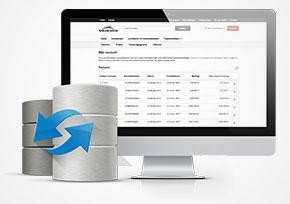Blog
Grow Your Business Online with Integration
DynamicWeb
By tapping into your Enterprise Resource Planning (ERP) system, and engaging people online, your business has the opportunity to serve more customers and offer a better customer experience.

A lot of companies do, however, sit on useful tools and information without even knowing what they’ve got. One of those tools is your Microsoft Dynamics NAV system.
The Cheese Stands Alone. NAV doesn’t. Many companies implement an ERP system, but they don’t fully know how to use it to expand their business and simplify the sales process. Microsoft Dynamics NAV is a powerful ERP, but it becomes exponentially more useful when integrated with eCommerce, a Web Content Management System (CMS), and online marketing.
eCommerce refers to any online selling, B2C or B2B. Did you know B2B eCommerce is even bigger than B2C? The Web CMS handles the content and material you post on your website, everything from product pages to your “About Us” page. Online marketing targets your potential customers and provides the analytics to help you make the right business decisions. Combined with NAV, these solutions grow your business by providing customers with a personalized experience and making it easier for them to buy and buy often.
No Juggling Needed. You may wonder, “How do I juggle all of these systems?” And that’s where the beauty of integration comes in. You don’t need a PhD in Juggling to handle well-integrated systems. ERP, CMS, eCommerece – these are systems that work together. With integration, Microsoft Dynamics NAV is all set to get by with a little help from its friends.
Start the Conversation. The first order of integrating your online systems with Microsoft Dynamics NAV is to get them talking, so you want an eCommerce solution that has the right connectors for NAV. Once the conversation starts, your eCommerce solution and Web CMS gain access to the treasure trove of data in your ERP. With integration, data that is updated or changed frequently (such as inventory) remains accurate and up-to-date across all your systems.
This has great benefits for your customers. eCommerce integrated with your ERP lets you provide up-to-date product and pricing information right on your webshop. To keep customers informed, automate emails with receipts, order confirmations, and shipping information. You may even want to offer customer-specific pricing. Integrating with other systems, such as your Customer Relationship Management (CRM), allows you to target individual customers even further.
Customization for Customers. For many customers, particularly in B2B sales, customization is a priority. The solutions they need are highly individual. Giving your webshop access to your inventory allows your customers to customize their own products, all online.
Using a configurator (such as Cincom’s Guru), online customers set the exact specifications for the product they want. Then you either let them make the purchase directly online or the customer submits their product configuration for a quote that your sales team follows through. Accurate product configuration is made possible because your site has real-time access to your ERP.
Sitting on a Resource. Unless you own land in 1849 California, we don’t recommend digging up the Earth looking for nuggets of precious metals. But if you want to grow your customer base and make it easier for all customers, new and existing, to buy from you, consider the resource that you are sitting on – your Microsoft Dynamics NAV. Integrated with an all-in-one eCommerce solution (with CMS and online marketing), your ERP offers you the potential to expand your business on the Internet and engage customers across the globe.
We’re also here to help with any other questions or needs — email our team at info@dynamicweb.com.